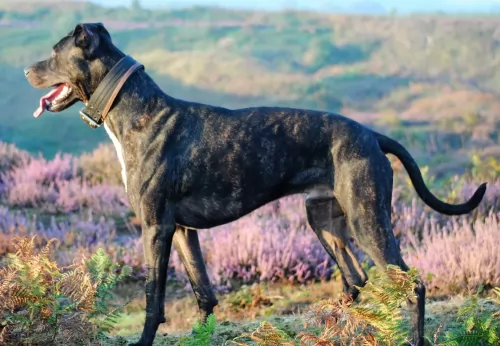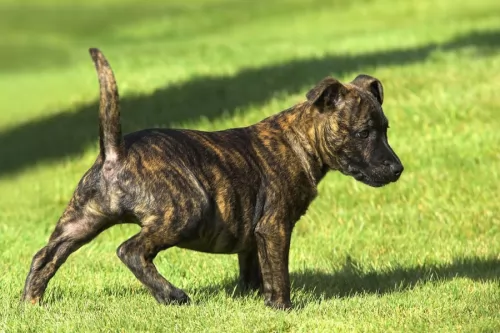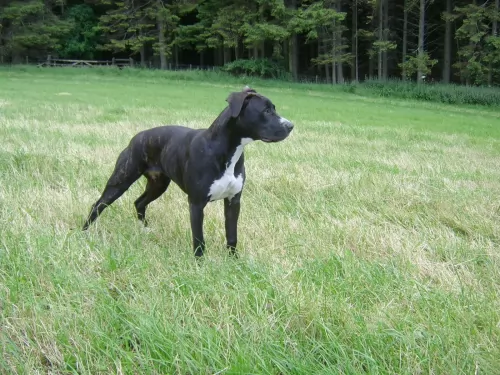 Petzlover
Petzlover Alaunt is originated from Afghanistan but Irish Mastiff Hound is originated from United States. Alaunt may grow 6 cm / 2 inches shorter than Irish Mastiff Hound. Alaunt may weigh 6 kg / 13 pounds lesser than Irish Mastiff Hound. Both Alaunt and Irish Mastiff Hound has same life span. Both Alaunt and Irish Mastiff Hound has almost same litter size. Alaunt requires Low Maintenance. But Irish Mastiff Hound requires Moderate Maintenance
Alaunt is originated from Afghanistan but Irish Mastiff Hound is originated from United States. Alaunt may grow 6 cm / 2 inches shorter than Irish Mastiff Hound. Alaunt may weigh 6 kg / 13 pounds lesser than Irish Mastiff Hound. Both Alaunt and Irish Mastiff Hound has same life span. Both Alaunt and Irish Mastiff Hound has almost same litter size. Alaunt requires Low Maintenance. But Irish Mastiff Hound requires Moderate Maintenance
 Alaunt is an extinct breed that existed 3000 years ago since 300 years ago. They were very popular dogs and people used them for many different tasks. They were a perfect working dog, but also they were used for wars and many other situations. Since the migrating was very common through the history, there were many different Alaunt breeds all over the Europe and Asia. Alaunt originated from central Asia, probably Afghanistan.
Alaunt is an extinct breed that existed 3000 years ago since 300 years ago. They were very popular dogs and people used them for many different tasks. They were a perfect working dog, but also they were used for wars and many other situations. Since the migrating was very common through the history, there were many different Alaunt breeds all over the Europe and Asia. Alaunt originated from central Asia, probably Afghanistan.
 The Irish Mastiff Hound is a huge dog – a mix of the English Mastiff and the Irish Wolfhound.
The Irish Mastiff Hound is a huge dog – a mix of the English Mastiff and the Irish Wolfhound.
Both of these dogs have been around for a long time and actually have ancient histories. The Mastiff for instance has origins that date back to ancient times in China, while the Irish Wolfhound has origins that date far back to 391 AD.
Today this dog is regarded as an excellent companion for any home.
 Weight of the Alaunt variates and it depended from dog to dog. The average weight of this breed was 20-68kg. While their height was 56-85cm. Females were slightly smaller with an average weight of 16-60kg, with a height of 50-80cm.
Weight of the Alaunt variates and it depended from dog to dog. The average weight of this breed was 20-68kg. While their height was 56-85cm. Females were slightly smaller with an average weight of 16-60kg, with a height of 50-80cm.
A lifespan of Alaunt was 10-12 years. Litter Size of an average Alaunt was 6-10 puppies.
Other Names for Alaunt are White Kazbegi, White Balkan dogs, Alaunt Gentil, Alaunt de Boucherie, Boucherie
 This is a large crossbreed which can stand at 85 to 91 cm in height and weigh in the region of 47kg to 74kg.
This is a large crossbreed which can stand at 85 to 91 cm in height and weigh in the region of 47kg to 74kg.
He essentially has the short, smooth coat of the Mastiff but other dogs may well inherit the longer, more wiry coat of the Wolfhound. Coloring of the coat can be quite varied and can be brown, grey, white, tan or black. Some dogs take more after the Mastiff while others have more Wolfhound characteristics. They have a large head, some have a somewhat wrinkly face because of the Mastiff side, the ears are fairly small and floppy and the tail is long.
Even though they're so huge, these are easy going dogs that are able to fit in well with most human families. Described as gentle giants, they are loving, loyal, easy-going, even-tempered and eager to please.
The Irish Mastiff does well in the city or in the country because he isn't particularly active and will be happy to have a comfortable spot to lie close to you, however with such a large dog, you will certainly need a garden.
 This breed was very powerful. They could adjust to any climate without any problems. Alaunt needed a lot of exercises because they were very strong and active dogs. They were also very intelligent dogs who knew what it wanted. People loved this breed because they were very smart, but also the perfect companion in every situation. Very protective but kind breed was loved in many countries.
This breed was very powerful. They could adjust to any climate without any problems. Alaunt needed a lot of exercises because they were very strong and active dogs. They were also very intelligent dogs who knew what it wanted. People loved this breed because they were very smart, but also the perfect companion in every situation. Very protective but kind breed was loved in many countries.
 Your big Irish Mastiff Hound is cool, confident and calm. He isn't particularly energetic and as long as he gets a nice walk as well as some mental stimulation, he'll be happy, wanting to spend a good part of the day lying close to where you are.
Your big Irish Mastiff Hound is cool, confident and calm. He isn't particularly energetic and as long as he gets a nice walk as well as some mental stimulation, he'll be happy, wanting to spend a good part of the day lying close to where you are.
Socialization and training will be good for him and he learns easily. He is just a big gentle giant who promises to make you a wonderful canine friend.
 Many people find giant dogs irresistible because they're usually gentle, patient and loving. However, it is their very size which makes them more prone to certain health concerns and gives them a shorter lifespan.
Many people find giant dogs irresistible because they're usually gentle, patient and loving. However, it is their very size which makes them more prone to certain health concerns and gives them a shorter lifespan.
It is why it is so important to ensure you feed your pet a healthy diet to ward off illness. A large dog like the Irish Mastiff doesn't have a particularly long lifespan, and with good care he can get to 9, 10, 11, 12 years of age.
This condition is more common in large dogs and it can lead to joint degeneration, arthritis and pain. Your pet may even be reluctant to get up and greet you when you come home which can be very sad. Vet intervention will certainly be required.
This heart disease is commonly seen in large dog breeds where the heart becomes weak so that it can't pump blood throughout the body. Coughing, difficulty with breathing, weakness and lethargy are just some of the symptoms of this disease and will also require veterinary intervention.
 He has a short coat, and grooming of this laid-back dog will include brushing him twice a week, trimming his nails and making sure that you check inside his ears for ear infection.
He has a short coat, and grooming of this laid-back dog will include brushing him twice a week, trimming his nails and making sure that you check inside his ears for ear infection.
Large dogs have special nutritional needs, particularly because they are more prone to illnesses such as hip dysplasia. You want to make sure that the foods he eats are rich in Omega-3 fatty acids, glucosamine, chondroitin, amino acids and antioxidants because these will ensure proper joint health.
You've got to be careful what you feed a large breed dog because of the weight management issue too. Excess weight puts stress on the joints and promotes the development of osteoarthritis. Speak to your vet about portion control and meat protein for your pet and how to ensure excellent nutrition to avoid common dog illnesses.
Fresh, cool water needs to be available to your pet every minute of the night and day.